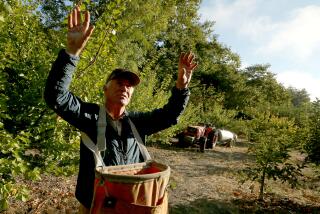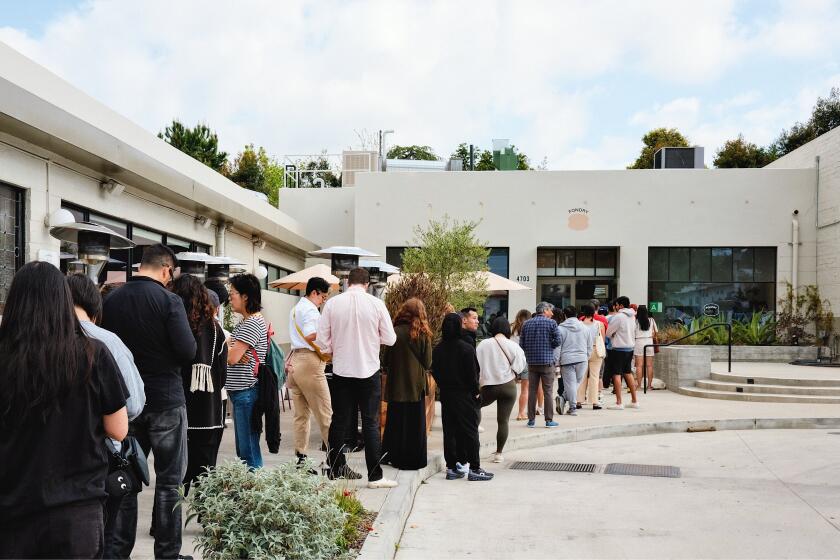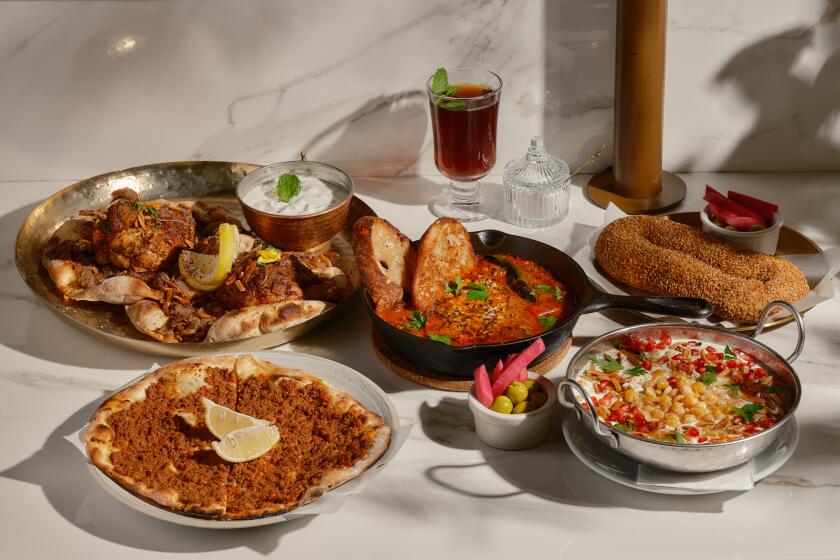Market Watch: The short, sweet life of Valencia Pride mangoes
Deborah Wong Chamberlain’s luscious Valencia Pride mangoes are among a very few elite fruits, such as Blenheim apricots, Snow Queen nectarines and Persian mulberries, whose seasonal appearance at farmers markets occasions the most intense anticipation and excitement.
In some ways they elicit the ultimate degree of craving and strategizing among farmers market cognoscenti: They’re expensive and require careful planning to obtain, and they taste like a sweet dream incarnated as fruit.
Valencia Pride, a Florida variety selected in 1941, is alluring in appearance, large, long and slender, with canary yellow skin and a delicate pinkish red blush. It’s exquisitely aromatic, with deep orange, juicy, very sweet, fiber-free flesh.
Why can’t all mangoes be so sublime? Although one can sometimes find very good imported mangoes in the supermarket, generally they have been treated with hot water vapor to kill pests, which also kills the aroma; farmers often grow productive and colorful but inferior-tasting varieties such as Tommy Atkins; and the use of paclobutrazol and nitrogen to regulate flowering boosts production at the expense of flavor.
Chamberlain grows just 20 trees of Valencia Pride at her farm at North Shore in the Coachella Desert, the only area in the continental United States, other than Florida, suitable for growing this crop. She’ll sell this premium variety for about two more weeks at the Santa Monica Wednesday market and then switch to Keitt, which is green and football-shaped, with flavor that’s almost but not quite as good.
Last Wednesday, after the first picking, all the fruit that Chamberlain brought was spoken for in advance, even at the heady price of $40 for an 11-pound box, or $3.49 a pound individually. To reserve mangoes, talk to Chamberlain or her vendors at the market, call her at (760) 265-9167 or email her at wongfarms@aol.com.
Great grapes
Prime season for grapes has begun, with an abundance of varieties for every taste. The harvest of Flame Seedless, small, round, firm and crisp, began a few weeks ago, but they’re at their sweetest and freshest now and for the next month. Picking just started for Thompson Seedless, although it’s not yet common to find berries that are light amber in color rather than dark green, an indication of sweetness. It’s also worth looking for Thompson “naturals,” smaller and rounder than supermarket berries, because they have not been produced on vines that were girdled and sprayed with gibberellic acid.
So-called Champagne grapes have very small, dark reddish-black berries, a distinctive form that makes them festive and fun to eat. They’re properly called Black Corinth grapes and traditionally have been dried into the tiny raisins used in baking called Zante currants. The fresh berries don’t store well, so now’s the best time for them.
All of the previous varieties, like most commercially available grapes, have what is called in the trade a “neutral” flavor, meaning not very much at all other than sweetness. The real flower of viticulture are muscat grapes, which are not only very sweet but also have a musky floral aroma, which is beloved by some and detested by others.
The type of the class is Muscat of Alexandria, a large, round, seeded grape, with tender, very sweet, intensely aromatic flesh. Ideal berries of this variety are starting to turn slightly amber, but even green specimens are sometimes very ripe and flavorful; taste a sample to know for sure.
Seeded grapes are a tough sell for many Americans, including practically everyone under 40. Breeders tried over the decades to develop seedless grapes with real muscat flavor but succeeded only recently. Princess, formerly known as Melissa, is a green oblong variety that develops muscat flavor only when its quite ripe — a state that you’re more likely to see at a farmers market than a supermarket, because at that stage the berries “shatter,” i.e. fall off the bunch.
Sweet Scarlet has a stronger muscat flavor, especially when fully ripe. For best flavor, look for bunches with dark red berries.
Apkarian Family Farm of Reedley and Scott Farms of Dinuba offer especially impressive lineups of top-quality grapes. Apkarian recently started selling at Pasadena and Ventura on Saturdays and is also at Santa Clarita on Sundays and Thousand Oaks on Thursdays. Scott goes to Mar Vista on Sundays, and Westchester and Santa Monica on Wednesdays.
More to Read
Eat your way across L.A.
Get our weekly Tasting Notes newsletter for reviews, news and more.
You may occasionally receive promotional content from the Los Angeles Times.






